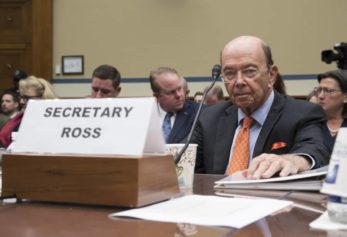The Supreme Court will hear arguments today in the challenge by Shelby County, Ala., to Section 5 of the Voting Rights Act, perhaps clearing the way for the court to strike down what is widely considered one of the most successful and effective pieces of legislation in U.S. history.
At issue is whether the bitter racism of the South has changed enough for the nine states under the jurisdiction of Section 5 to be freed from oversight by the U.S. Justice Department. Section 5 mandates that officials in a “covered” jurisdiction must prove to the satisfaction of federal officials that a “proposed voting change does not deny or abridge the right to vote on account of race, color, or membership in a language minority group.”
Nine states are completely “covered” by the section, while five other states have certain counties covered, and two states have only certain townships covered.
“The South has changed,” Frank “Butch” Ellis, the Shelby County attorney since 1964 — the year before the Voting Rights act was enacted — told NPR’s Supreme Court expert, Nina Totenberg.
Ellis claims there’s no more discrimination in the South than anywhere else. “There’s probably bits of it everywhere, but there’s no evidence that it’s more prevalent in these covered jurisdictions than it is in the noncovered jurisdictions. That’s our complaint.”
But of course many don’t see it that way.
“Shelby County still advertises itself as the heart of the Heart of Dixie, and that tells you that some things have not changed, or at least haven’t changed enough to take the bandage off the wound,” said Pam Karlan to NPR. She is a voting-rights expert who wrote a “friend of the court” brief on behalf of the bipartisan group of lawmakers involved in the 2006 reauthorization of the act.
The overwhelmingly bipartisan vote by Congress in 2006 is a key piece of legislation for those who want to keep the act in place. In this time of bitterly partisan politics, Congress voted 98-0 in the Senate and 390-33 in the House to extend the act another 25 years, then it was signed into law by President George W. Bush.
“What the 12,000 pages of hearing (testimony) showed” is that for many of the jurisdictions, “there still was pervasive discrimination,” said Republican Congressman James Sensenbrenner of Wisconsin, who led weeks of hearings in the House as chairman of the Judiciary Committee in 2006 when the act was extended.
In an opinion piece for Politico, Rep. Trey Martinez Fischer, a seven-term Texas representative from San Antonio and chairman of the Mexican American Legislative Caucus, wrote, “When so many lawmakers agree on a bill, and a president not only signs the bill into law but also uses one of his last acts in power in 2009 to try to uphold that law when challenged (by a group of Texans, no less), the Supreme Court, as a co-equal branch of government, should take note.”
When the court upheld the Voting Rights Act in 2009, Chief Justice John Roberts made a statement that shook defenders of the act to their core, because he seemed to be signaling a willingness to strike down Section 5.
“Things have changed in the South,” Roberts said in announcing the decision. The “burdens” imposed by the law “must be justified by current needs.” The Voting Rights Act, he said, “differentiates between the states in ways that are in tension with our fundamental tradition of equal sovereignty among the states.” And, he added that these distinctions “may no longer be justified by current conditions.”
As the Court hears arguments today, all eyes will be on Justice Anthony Kennedy, who is considered the swing vote.
“The 15th Amendment to the Constitution makes quite clear this is in the province of Congress,” Myrna Perez, a voting rights expert with the Brennan Center for Justice, a nonpartisan institute at the NYU School of Law, told CBSNews.com. “Given the clarity of constitutional authority, I think ultimately the court is going to be deferential.”
If the court strikes Section 5 down, she said, “I think it would be an extraordinary interference with a constitutionally determined province of Congress.”
A piece in The Atlantic points out that there is still “an astonishing level” of racial discrimination in the application of voting laws.
Quoting from the legal papers filed by the federal government in the Shelby County case, The Atlantic said that since 1982, “… approximately 2,400 discriminatory voting changes had been blocked by more than 750 Section 5 objections, approximately 400 of which involved cases with specific evidence of intentional discrimination.”
Without Section 5, the government argued in the court papers, minority voters would have had to sue individually, at great cost of time and money, in some cases after having lost their right to vote.
Last week, President Obama attempted to ease the fears about what will happen to the voting rights of minorities if Section 5 is declared unconstitutional by the court.
“I know in the past some folks have worried that if the Supreme Court strikes down Section 5 of the Voting Rights Act, they’re going to lose their right to vote. That’s not the case,” Obama said in an interview on SiriusXM with host Joe Madison. “People will still have the same rights not to be discriminated against when it comes to voting, you just won’t have this mechanism, this tool, that allows you to kind of stay ahead of certain practices.”
